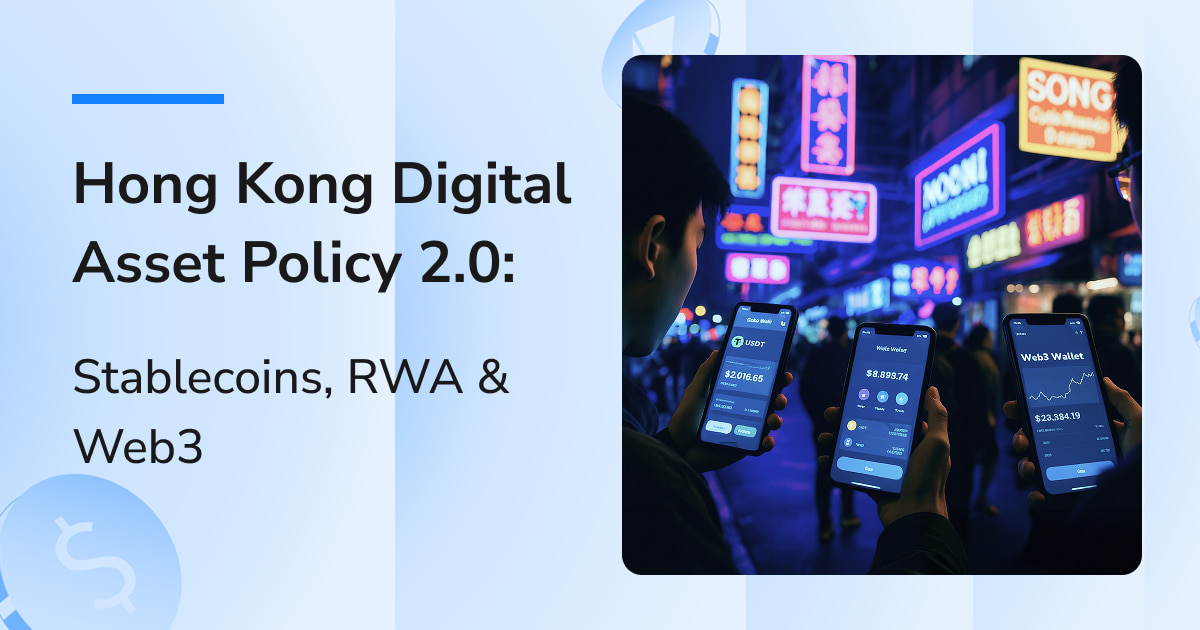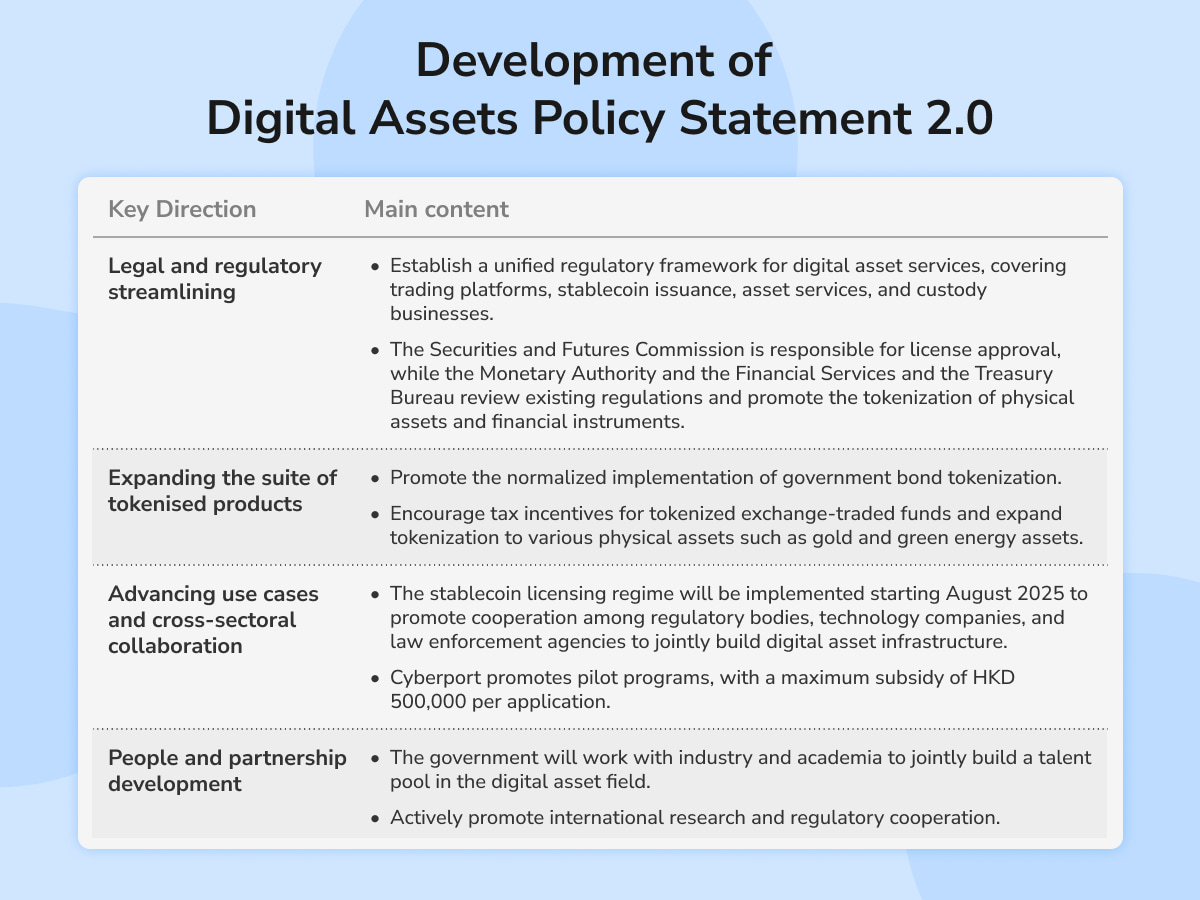Hong Kong Digital Asset Policy 2.0: Stablecoins, RWA & Web3

With stablecoins and traditional brokerages gradually opening up crypto investment channels—and related concept stocks gaining traction—the Hong Kong government is riding this wave of enthusiasm. On June 26, the Hong Kong SAR government officially announced the Hong Kong Digital Asset Development Policy Statement 2.0, building upon the 2022 policy with more concrete measures and reaffirming its goal of transforming Hong Kong into a global hub for digital asset innovation.
The "LEAP" Development of Digital Assets of Policy Statement 2.0
The Hong Kong government seeks to build a secure and innovative digital asset ecosystem, balancing risk management, investor protection, and growth of the real economy and financial markets. The policy’s “LEAP” framework highlights:
1. Legal and regulatory streamlining
The government plans to establish a comprehensive regulatory regime covering trading platforms, stablecoin issuers, digital asset services, and custodians. The SFC will be responsible for licensing these entities, while the Financial Secretary and HKMA will review related laws and promote tokenization of real-world assets and financial instruments.
2. Expanding the suite of tokenized products
The government aims to normalize tokenized government bonds and provide incentives such as stamp duty exemptions for tokenized ETFs to enhance liquidity and market adoption. Future plans may include tokenization of assets like gold, green energy, and renewable energy.
3. Advancing use cases and cross-sectoral collaboration
From August 1, stablecoin issuers will need licenses, ensuring stablecoins are used in real-world applications. The government will also foster cooperation between regulators, law enforcement, and tech firms to build infrastructure. Cyberport has launched a Blockchain and Digital Asset Pilot Support Scheme, offering up to HK$500,000 to encourage experimentation in areas such as stablecoins, RWA tokenization, and Web3 security.
4. People and partnership development
The government aims to make Hong Kong a global knowledge center for digital assets by working with academia and industry to cultivate talent and promote international cooperation and joint research.

A System Upgrade: Stablecoins as "Infrastructure Currency"
Dr. Xiao Feng, Chairman and CEO of HashKey Group, shared his views on Policy Statement 2.0 in a media interview. He noted that this policy isn’t just a refinement of the old one, but represents a true system upgrade. The policy is structured around the “LEAP” strategy, with a comprehensive layout covering compliance regulation, asset tokenization, expanded applications, and talent cultivation. Dr. Xiao highlighted three key changes:
• Stablecoins formally regulated:
Hong Kong will officially launch its stablecoin licensing regime on August 1, 2025—a rare move globally—effectively granting stablecoins a formal “license to operate” within mainstream financial systems.
• RWA tokenization positioned as a key sector:
Beyond tokenized government bonds, assets like gold, green energy, and electric vehicle-related assets will also be included in tokenization plans.
• Tax incentives for tokenized ETFs and digital asset funds:
Once legislated, tokenized ETFs could enjoy stamp duty and profits tax exemptions, similar to traditional ETFs—rewriting the financial market’s rules.
Dr. Xiao also pointed out that stablecoins are evolving from utility currencies to infrastructure currencies. Hong Kong’s regulatory design is rigorous, requiring issuers to hold statutory reserves, offer clear redemption mechanisms, and have sound risk management. In short, stablecoins are no longer just a tool for tech enthusiasts—they’re poised for adoption by banks, cross-border payment systems, and even government agencies.
Regarding the crypto industry’s broader impact, Dr. Xiao noted that previously the sector was divided: on one side, on-chain assets like BTC and ETH; on the other, the traditional financial system. Now, thanks to stablecoins and RWAs, the gap is being bridged—a phenomenon he calls “digital twins.” In essence, real-world assets—such as green energy rights, vehicle warehouse receipts, government bonds, and gold—can now be traded on-chain, elevating tokenization from concept to true Web3-grade applications.
Hong Kong’s Virtual Asset Regulation Enters a New Phase
Currently, Hong Kong’s crypto activities are jointly overseen by the SFC (which regulates virtual asset trading) and the HKMA (which oversees stablecoins and digital payment services). Key licenses include:
Type 1: Dealing and distribution
Type 4: Investment advisory
Type 7: Automated trading (often paired with a VASP license)
Type 9: Asset management
As of June 2025, Hong Kong has 11 licensed digital asset trading platforms (e.g., OSL, HashKey), and around 40 licensed brokers have upgraded to offer virtual asset trading, including Guotai Junan International, Futu, Hafu Securities, and Interactive Brokers. Most provide BTC, ETH, and other major tokens via integrated accounts on licensed exchanges.
Policy Statement 2.0 marks a new phase in Hong Kong’s digital asset development—with clearer regulations, more diverse products, and stronger institutional participation. Moving forward, RWAs and stablecoins will be the main drivers, as Hong Kong advances toward becoming a global digital asset hub.
Looking at Taiwan, the government has already completed the first three phases of basic regulatory setup and is entering the final stage of drafting dedicated crypto legislation in the first half of 2025. The review, transitional clauses, and public hearings are at a critical stage, and the next six months will be key to Taiwan’s digital asset regulatory progress!
ZONE Wallet
ZONE Wallet is a blockchain investment gateway designed for Taiwanese users.
It combines full regulatory compliance, cutting-edge security, and TWD transaction support, with a mission of making “every crypto transaction safe and secure.”
Start building your crypto portfolio with ease—today.
Investing in virtual assets carries risks related to price volatility and liquidity. The above content is for reference only and does not constitute any financial advice. Please carefully assess your financial situation before investing and be cautious of potential fraud.






